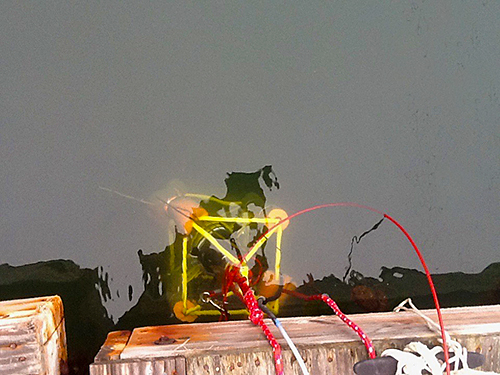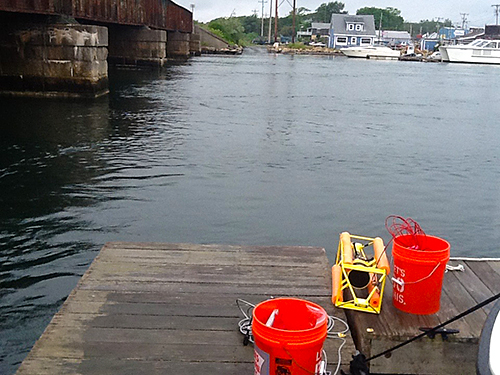Newsletters & Press
New Releases
For Immediate Release
October 12, 2025
Contact:
John Miller, MRECo Executive Director
Director@MRECoNewEngland.org
https://www.mreconewengland.org/contact-us/
MRECo awarded $1.9 million To Develop Test Sites for Tidal and Wave Energy
New Bedford, Mass. – The Massachusetts Clean Energy Center (MassCEC) today announced $1,885,870 in funding to enable the Marine Renewable Energy Collaborative (MRECo) to upgrade and expand its shallow water and nearshore test facilities, including new data systems, improved safety and sensor deployment at the Bourne Tidal Test Site, electrical grid access for tidal turbines, and enhanced infrastructure for testing floating devices and wave energy buoys off Cuttyhunk Island.
Through its new Ocean Innovation Network, this award will further position Massachusetts as a leader in ocean technology, accelerating the development of new solutions while fostering connections among marine science and technology businesses, particularly on the South Coast, Cape Cod, and the North Shore.
“This is how we lead—with strong investments that give inventors and researchers access to labs, testing facilities, and coastal sites where they can build and deploy real technology like underwater drones, smart buoys, and marine sensors that will change how we understand and protect our oceans,” said Governor Maura Healey. “This program will help drive solutions that can put our state on the map as a global leader in ocean science and technology, pushing the boundaries of what’s possible with natural resources.”
The Ocean Innovation Network will have a direct impact on local businesses by expanding access to shared testing facilities located at existing docks and in nearshore and offshore areas. These sites will allow companies to test and improve their technologies, making it easier for them to bring new products to the market. The initiative will also support organizations that help entrepreneurs navigate the challenges of logistics, supply chain, and permitting, ensuring they have the resources they need to thrive. Additionally, the program will expand co-working facilities for oceantech startups. To ensure companies are well-prepared to succeed, mentorship programs will be developed to guide them through engaging with customers, refining their products, and bringing them to market.
The initiative builds on MassCEC’s Climatetech Economic Development Strategy and Implementation Plan, a roadmap for ensuring Massachusetts remains a global climatetech leader. The plan calls for strategic investments in testing and demonstration assets, physical and programmatic support for startups, and stronger coordination across the ecosystem.
“Oceantech startups are developing innovative ways to make maritime industries more energy efficient, protect marine life and coastal communities, and generate clean, local power from the ocean. With the Ocean Innovation Network, we are building the infrastructure and support system that these startups need to thrive,” said MassCEC CEO Dr. Emily Reichert. “These awards are a down payment on a stronger, more connected network that will accelerate innovation, expand access to testing and workspaces, and reinforce Massachusetts as the premier place to launch and grow oceantech businesses and jobs.”
For more information, visit www.masscec.com/our-focus/offshore-wind/ocean-innovation.
About the Massachusetts Clean Energy Center
The Massachusetts Clean Energy Center is a state economic development agency dedicated to accelerating the growth of the clean energy and climatetech sector across the Commonwealth to spur job creation, deliver statewide environmental benefits, and secure long-term economic opportunities for the people of Massachusetts. Since 2010, MassCEC has awarded nearly $800 million in programs and investments and attracted more than $2.8 billion in private and public funds.
###
Bourne Tidal Test Site Gets National Recognition

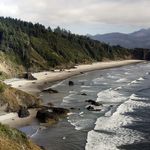 How U.S. Marine Energy Test Sites Are Driving Innovation
How U.S. Marine Energy Test Sites Are Driving Innovation
Across the U.S., innovative test sites are pioneering real-world solutions, advancing marine energy from lab to grid. These engineering hubs not only refine groundbreaking technologies but also call on the expertise of hydropower professionals to help shape the next frontier of U.S. water power innovation.
###
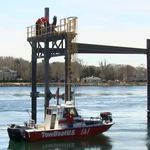 On Cape Cod, Researchers Are Trying to Harness the Power of the Tides
On Cape Cod, Researchers Are Trying to Harness the Power of the Tides
The Marine Renewable Energy Collaborative is conducting tidal turbine testing at the Bourne Tidal Test Site located at the Cape Cod Canal.
###
 NBC10 Boston
NBC10 Boston
Video of the Week: Testing Tidal Turbines in the Cape Cod Canal
###
Bourne Tidal Turbine Test Site Awarded FERC License; First in the U.S.
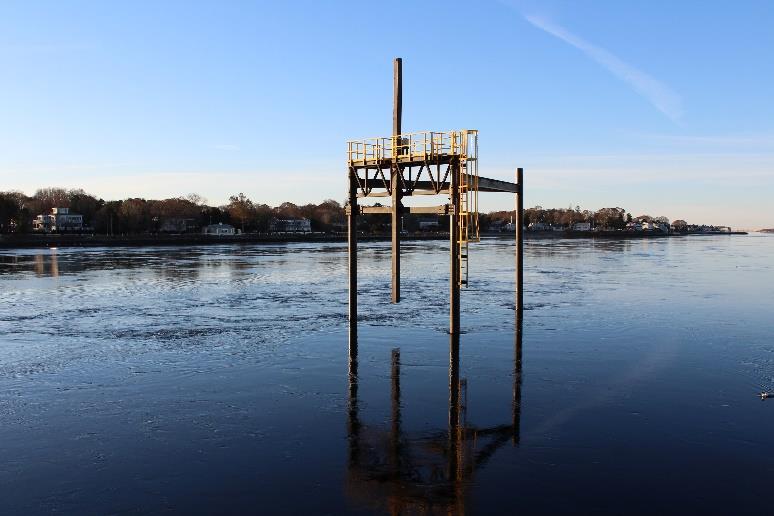
Bourne Tidal Test Site (BTTS), Cape Cod Canal, Massachusetts
April 23, 2024
FOR IMMEDIATE RELEASE
Contact:
Stephen Barrett
+1-508-728-5825
MRECNewEngland@Gmail.com
Buzzards Bay, Massachusetts – April 17, 2024
The Marine Renewable Energy Collaborative (MRECo) has been awarded an 8-year pilot license by the Federal Energy Regulatory Commission (FERC) to test marine renewable energy- generating tidal turbines at the Bourne Tidal Test Site in Bourne, Massachusetts. The Bourne Tidal Test Site (BTTS) is the only tidal test site in the U.S. to have obtained such a license. This license allows turbines to generate renewable electricity directly to the grid.
BTTS provides tidal turbine developers an unmatched capability for testing prototypes up to 3 meters in diameter. The FERC license will allow the test site operator, MRECo, to manage the testing of tidal turbines in the fast moving ocean waters of the Cape Cod Canal. Aspects of the testing include turbine efficiency, generation capacity, durability, and potential environmental effects.
Developing new turbine technologies in very challenging and costly. University test tanks can only test small prototypes and components of less than one meter. Testing large devices in the ocean requires extensive permitting that is costly and time consuming. This has slowed development of new technologies. The BTTS was designed to solve this problem.
The BTTS was designed and constructed with Massachusetts Seaport Economic Council funding to address the test site shortage. It has a fixed test stand without the flow disruption resulting from testing off of barges or bulkheads. A lifting arm enables easy access for tidal turbines while the stability allows better accuracy from sensor. It is the only test site with these capabilities in the U.S. and perhaps the world.
MRECo is a non-profit corporation dedicated to the sustainable development of ocean renewable energy. MRECo is also advancing testing of wave energy generators in Massachusetts water. It has been estimated that tidal energy could provide one tenth of the world’s electricity needs and Massachusetts waters could generate the equivalent of a nuclear power plant. Tidal energy has been shown to have minimal impact on the environment because the blades turn slowly and placed on the ocean bottom has no visible impact on coastal beaches.
John Miller, the MRECo Executive Director, noted, “To meet climate change challenges, we need all the sources of renewable energy available. Tidal energy is an important piece of the mix because it is reliable, predictable, and available along coasts where population densities are highest. New England has the intellectual capital available in its universities to lead in developing this source and BTTS provides a critical tool. Thirty years ago Professor Gorlov from Northeastern University invented a new type of turbine with helical blades and tested it at the site where BTTS is located. That technology has been commercialized and is being deployed in Alaska and exported to Chile. Its time for the next generation and we are ready.”
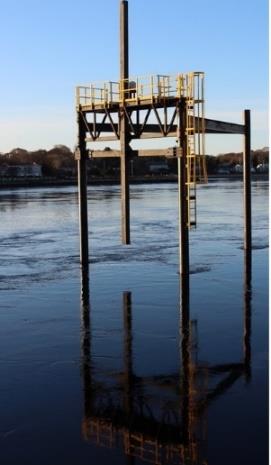
BTTS
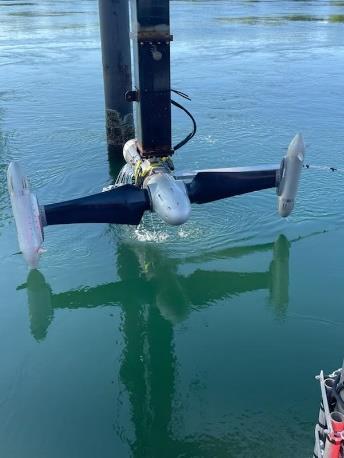
Turbine Testing
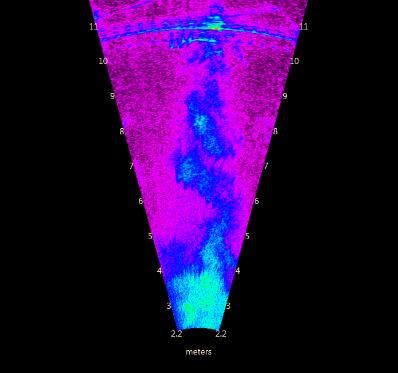
Sensor Testing – Acoustic Imaging photo
BTTS also hosts the Marine Observatory for Sensor Testing (MOST), a site that allows cost effective long term testing of ocean sensors.
###
For Immediate Release
Thursday, August 18, 2022
Contact: John Miller, Executive Director, Marine Renewable Energy Collaborative; 508-728-5825; director@mreconewengland.org
Army Corps License Extension Granted to Bourne Tidal Test Site
The Marine Renewable Energy Collaborative of New England (MRECo) announced that the US Army Corps of Engineers (USACE) has renewed its license for the Bourne Tidal Test Site (BTTS), allowing them to conduct an extended test, starting in October, of a new tidal energy technology developed by Littoral Power Systems, Inc. of New Bedford MA. This test will allow MRECo to demonstrate the capability of BTTS to provide a controlled test environment in ocean waters for new hydrokinetic technologies. BTTS is a test berth for marine energy technologies and underwater sensors located near the Buzzards Bay end of the Cape Cod Canal.
“Harvesting energy from ocean currents is emerging as an enormous global opportunity. It is predictable, environmentally benign, and makes no claims on land space. It is fair to say that the market is much more advanced in Europe and the U.K. than is currently the case in the USA. BTTS’s pre-permitted and instrumented test capability will allow rapid domestic progress on marine energy devices in a real-world environment,” remarked David Duquette, CEO of Littoral Power Systems, Inc.
The USACE license extension allows testing to proceed while MRECo applies for a Federal Energy Regulatory Commission (FERC) license, which will enable the organization to connect to the electrical grid. Additionally, MRECo is working toward BTTS’s receiving approval under the U.S. Department of Energy Water Power Technologies Office’s Testing & Expertise for Marine Energy (TEAMER) program. TEAMER allows technology developers to conduct physical testing of mid-scale prototypes – including hydrokinetic devices, sensors and subsea communication devices – using Federal funds. As a TEAMER site, BTTS will provide the infrastructure and support needed for Technology Readiness Level (TRL)-gated development for testing in a relevant open water environment. Final approval of BTTS under the TEAMER program is contemplated in spring 2023; among other things, the site needs to clear National Environmental Policy Act (NEPA) review.
BTTS permitting has been primarily funded to date by the MA Seaport Economic Council and the Falmouth Economic Development and Industrial Corporation.
# # #
Marine Renewable Energy Collaborative: MRECo is dedicated to the sustainable development of marine energy in New England and is focused on providing the first permanent tidal energy test stand in the United States. Southeast Massachusetts and Rhode Island are globally recognized as centers for the development and testing of innovative marine technologies. www.mreconewengland.org
Littoral Power Systems, Inc.: LPS addresses the problems of cost, environmental impact, and regulatory complexity in hydropower and ocean energy. It develops, manufactures and installs products that reduce the time, cost and risk of getting projects built. LPS aims to fundamentally change perceptions about waterpower by providing solutions that are sensitive in the extreme to the long term health of marine species and ecosystems. www.littoralpower.com
TEAMER: The US Department of Energy’s Testing Expertise and Access for Marine Energy Research (TEAMER) program enables technology developers to conduct tests at various facilities throughout the country. Click on the following link for more details about TEAMER https://teamer-us.org/product-category/tank-basin/
###
June 25, 2022
Contact: John Miller, Executive Director, MRECo 508-728-5825; director@mreconewengland.org
Congratulations to URI for Receiving TEAMER Acceptance
The Marine Renewable Energy Collaborative of New England (MRECo) congratulates the University of Rhode Island (URI) for its recent acceptance into the US Department of Energy’s Testing Expertise and Access for Marine Energy Research (TEAMER) program. Click on the following link for more details about TEAMER https://teamer-us.org/product-category/tank-basin/
TEAMER funding enables technology developers to conduct tests at URI’s Ocean Engineering Department facilities including at its wave tank, wave-current flume, and acoustic tank. There is no charge to clients who choose to use URI facilities. TEAMER reimburses URI’s fees directly. In addition to increasing collaborative R&D projects with experts and faculty members, URI students will have opportunities to work directly with technology developers and gain valuable experience which can be applied when they are ready to join the rapidly-growing marine renewable energy workforce.
MRECo’s Bourne Tidal Test Site (BTTS) located at the southern end of the Cape Cod Canal has been recommended for TEAMER acceptance, pending National Environmental Policy Act (NEPA) review. Once the NEPA review has been completed, BTTS will provide a unique open water, yet close-to-shore, prototype testing facility for tidal and current energy devices and many types of marine sensors and underwater communication devices. The BTTS will provide clients with the infrastructure and support needed for Technology Readiness Level (TRL) gated development for mid-scale prototype testing in a relevant open water environment. https://www.mreconewengland.org
MRECo is dedicated to the sustainable development of marine energy in New England and is focused on providing the first permanent tidal energy test stand in the United States. Southeast Massachusetts and Rhode Island are globally recognized as centers for the development and testing of innovative marine technologies.
According to John Miller, Executive Director of MRECo, “the intellectual capital represented by the universities in New England provided much of the technology that powers today’s solar and wind generation. This infrastructure in New England coupled with TEAMER funding for testing will provide the same acceleration to marine renewables.”
###
October 23, 2018
MA Legislature Approves Funding for Tidal Energy Data Transmission
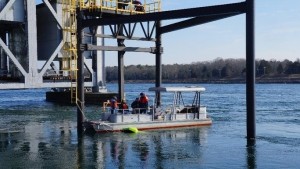 (Marion, MA) MRECo has received word that $205,000 has been included in the Massachusetts Economic Development Bill to put the BTTS on the grid. https://malegislature.gov/Laws/SessionLaws/Acts/2018/Chapter228
(Marion, MA) MRECo has received word that $205,000 has been included in the Massachusetts Economic Development Bill to put the BTTS on the grid. https://malegislature.gov/Laws/SessionLaws/Acts/2018/Chapter228
When the funds are approved and released by the Governor’s office, and permits are approved, work will be done to wire the Bourne Tidal Test Site (BTTS) structure to shore to enable turbines and devices to receive shore power and to produce power to the grid. MRECo is in the process of preparing the Draft Pilot License Application required by the Federal Energy Regulatory Commission (FERC) in order to obtain grid interconnection.
State Senator, Vinny deMacedo was extremely helpful in securing the funds for this innovative project in his district. He stated recently, “ I was interested in working with the Marine Renewable Energy Collaborative because of the exciting possibilities associated with renewable energy sources. Working with MRECo has been especially significant due to their ability to attract others in this field with their neutral test site that utilizes the Cape Cod Canal. It is my hope that this approach will lead to the growth of the renewable energy industry in our region which already is home to some of the leading innovators of this technology.”
Lieutenant Governor, Karyn Polito’s office has been pushing for renewable energy projects and coastal infrastructure investments via the Seaport Economic Council grant program. MRECo is grateful for the vision and long standing commitment that the Baker/Polito Administration has provided to enable MA to become a leader in clean energy innovation.
In addition, MRECo is working with MassMaritime Academy to provide testing capabilities for university researchers and startup companies as well as training opportunities for students. These activities are in concert with making Massachusetts the go-to spot for developing new ocean energy technologies.
Follow this link for a printable version of this press release. >>>
# # #
State Senator Vinny de Macedo, Plymouth and Barnstable Districts serves in a leadership position as the Ranking Minority Member on the Senate Committee on Ways and Means, a key Senate committee which reviews all legislation related to the state’s finances as well as other important issues. He is also the Ranking Minority Member on the Joint Committee on Ways and Means where he serves as one of 6 members on the annual Budget Conference Committee. He has been a strong and consistent voice for fiscal responsibility. The Plymouth and Barnstable State Senate District includes the communities of Bourne, Falmouth, Kingston, Pembroke, Plymouth, and Sandwich.
The New England Marine Renewable Energy Collaborative (MRECo) is a nonprofit corporation that educates and involves all stakeholders (Academic, industry, governmental/regulatory, and public interest groups) to promote the sustainable development of renewable energy in New England ocean waters. The Bourne Tidal Test Site is located near the railroad bridge in the Cape Cod Canal outside of the navigational channel.
Information Contact: John Miller, Ex. Director Marine Renewable Energy Collaborative (508.728.5825)
Maggie Merrill, Communications Director, MREC0 (617.306.2764)
MRECo Seeks Funding for Students, Interns and STEM Project
Click Here to Donate

In keeping with our outreach strategy, we are spreading the word to educate the public and engage more students via STEM, internships and student projects at the Bourne Tidal Test Site. Funding is challenging in this nascent industry, therefore crowd funding for these items has become an option.
Please take a look at us on Chuffed.org
(https://chuffed.org/project/ocean-energy-for-new-england#) and consider making a donation of whatever size to show your support for clean renewable ocean energy education and development right here in New England. Thank you!
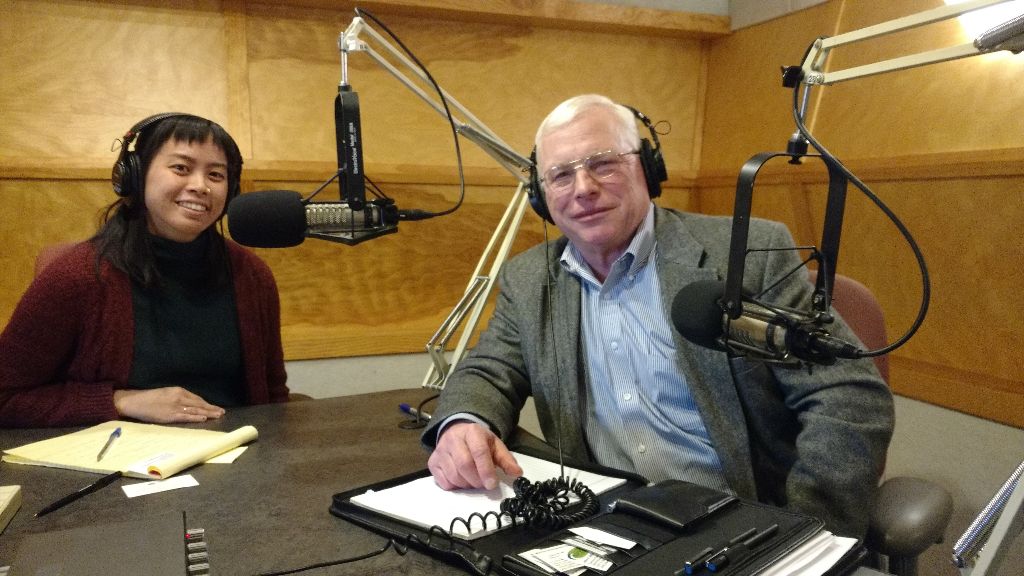 MRECo Executive Director, John Miller was interviewed by Sarah Tan at WCAI-Woods Hole, MA. Tan wanted to know what is happening with tidal energy world wide, in the US and at the Bourne Tidal Test Site located in the Cape Cod Canal. The story will be combined with a field interview Tan will make to the BTTS later next week (weather dependent).
MRECo Executive Director, John Miller was interviewed by Sarah Tan at WCAI-Woods Hole, MA. Tan wanted to know what is happening with tidal energy world wide, in the US and at the Bourne Tidal Test Site located in the Cape Cod Canal. The story will be combined with a field interview Tan will make to the BTTS later next week (weather dependent).
January 22, 2018
For Immediate Release [ Follow this link for a printable version of this news release. >>> ]
Info Contact: Maggie Merrill Communications Manager, MRECo; comms@mreconewengland.org, 617-306-2764
University of Rhode Island Students Retrieve ADCP at Bourne Tidal Test Site
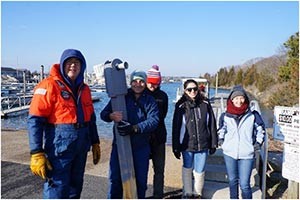
L-R BTTS Site Manager C. Eben Franks, URI crew: Soroush Kouhi, Chris Small, Sandra Deeb, Jesse Moore
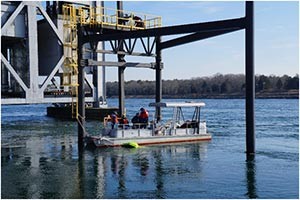
Soroush Kouhi listening to the Teledyne ADCP chirping at the boat ramp.
As part of a research project, entitled, “Assessment of the Tidal Energy at a Demonstration Site: Cape Cod Canal, MA, URI doctoral student, Soroush Kouhi and three URI Ocean Engineering students went out to the Bourne Tidal Test Site Friday Jan. 19, 2018 to retrieve the Acoustic Doppler Current Profiler (ADCP) that was deployed one month ago to take water column velocity data. The data will be analyzed to show what the water velocities were for 30 days. The high resolution data will be correlated to result in a projected energy power output. Determining projected power output for a tidal testing area is important because when device developers install their own turbines at the BTTS, they can compare data from their turbine to the actual energy output recorded by the URI team. Of course every turbine is different but all designers hope to top or match their previous power output results.
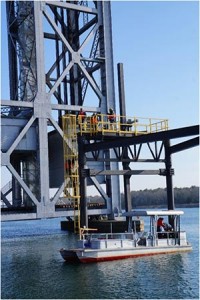
URI and MRECo crew installing water level senor atop the BTTS Platform.
The Teledyne ADCP is enshrouded in a bottom mount frame – called a Trawl Resistant Bottom Mount – that is very rugged and is easy to deploy and recover. It was simply placed overboard, fell to the seafloor, was tethered to the BTTS structure and left to collect data for the past month. As with anything that enters the challenging marine environment, the ADCP was seen being buffeted by the currents and the ice floes that move by with the current. Mercifully its buoyancy bladder deployed on target and it floated to the surface for retrieval. “Now we have the hard work to do. We have to get all the data, analyze and process it and determine next steps. This will take a month or so” said Kouhi.
While out there, the team lead by MRECo’s BTTS Site Manager C. Eben Franks installed is a downward looking sea surface level sensor that will correlate tidal heights with the water velocities recorded underwater by the ADCP. All of this data will be combined to further characterize the water flow environment at the BTTS.
[ Follow this link for a printable version of this news release. >>> ]
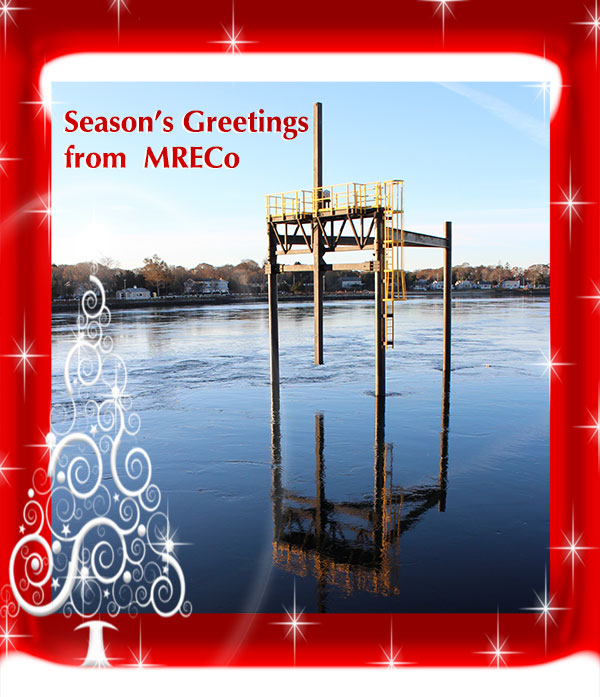 December 12, 2017 – Holiday Greetings from the Crew at MRECo
December 12, 2017 – Holiday Greetings from the Crew at MRECo
For Immediate Release
Wednesday November 22, 2017
Contact: Maggie Merrill, MRECo Communications Manager, 617.306.2764
Tidal Energy Test Site Installation Completed in Cape Cod Canal
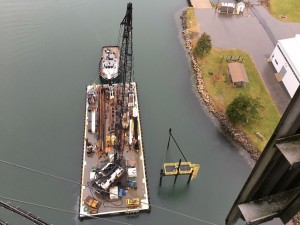 The first of its kind in the US, the Bourne Tidal Test Site (BTTS) was installed in the Cape Cod Canal during the past two weeks. Today, the day before Thanksgiving the barge, owned by AGM Marine, Inc. will pull up its moorings and be towed back to New Bedford, leaving the BTTS to stand ready for business.
The first of its kind in the US, the Bourne Tidal Test Site (BTTS) was installed in the Cape Cod Canal during the past two weeks. Today, the day before Thanksgiving the barge, owned by AGM Marine, Inc. will pull up its moorings and be towed back to New Bedford, leaving the BTTS to stand ready for business.
AGM Marine (Mashpee and New Bedford), drove three piles in the first three days and assembled the structure on top of the piles. In the past two days, the work platform was secured along with the winch that will power the lifting member that turbines will be attached to. The structure is now secure in the water off the Railroad Bridge and the US Army Corps of Engineers’ Cape Cod Canal Field Office.
The structure was built at MassTank (Middleboro, MA,). They are experienced at manufacturing steel tanks and large structures for all sorts of applications including marine and heavy industrial uses.
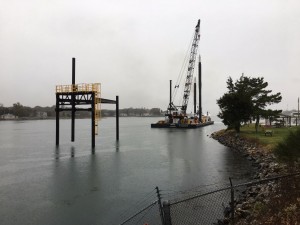 The next step for the test site will be to install the data acquisition, processing and transmission system atop the platform. Engineers from Impact Labs (New Bedford, MA) will be working out there in the weeks to come to analyze and test the systems. On the heels of that work, University of Rhode Island engineers have expressed interest in deploying one of their Acoustic Doppler Current Profilers to collect data that will enable them to precisely map the water velocity variations during several tidal cycles. This information will be extremely helpful for future operations.
The next step for the test site will be to install the data acquisition, processing and transmission system atop the platform. Engineers from Impact Labs (New Bedford, MA) will be working out there in the weeks to come to analyze and test the systems. On the heels of that work, University of Rhode Island engineers have expressed interest in deploying one of their Acoustic Doppler Current Profilers to collect data that will enable them to precisely map the water velocity variations during several tidal cycles. This information will be extremely helpful for future operations.
MRECo is actively seeking tidal device designers who require a place to get their equipment in the water to test performance and energy output. What’s unique about this test stand is that it is pre-permitted, easily accessed by small boat or crane from shore, and can be customized. The water velocity is in the 4 knot range which will enable developers who are aiming toward areas with higher water velocities such as the Bay of Fundy for example, to make invaluable design improvements before scaling up.
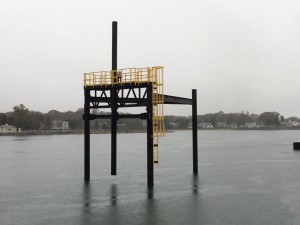 Several turbine developers have expressed interest in using this site to obtain data on their devices that are being aimed at remote, portable applications such as replacing diesel power generation for islands or for site specific energy generation.
Several turbine developers have expressed interest in using this site to obtain data on their devices that are being aimed at remote, portable applications such as replacing diesel power generation for islands or for site specific energy generation.
We also welcome those who have expressed interest in using the site to evaluate corrosion effects, biofouling in high currents, environmental impacts of turbines and much more.
The BTTS is the latest addition to the New England Marine Energy Development System (NEMEDS) which is a network of testing facilities located in a 100 mile radius. These test facilities will help tidal energy device designers obtain valuable information that will enable them to scale up and commercialize more efficiently.
Contact John Miller, Executive Director, MRECo to schedule time at the site. director@mreconewengland.org; 508-728-5825
[Follow this link for a printable copy of this release. >>>]
# # #
MRECo is a nonprofit organization that educates and involves all stakeholders (academic, industry, governmental/regulatory and public interest groups) to provide the sustainable development of renewable energy in New England waters.
Massachusetts Seaport Economic Council funded the project to support the emergence of tidal energy in New England waters.
Local representatives, Third Barnstable District State Representative David T. Vieira (R- East Falmouth) Congressman Keating have been very supportive of the project since its inception.
The Army Corps of Engineers have been very helpful in providing secure access to view and access the site as appropriate.
# # #
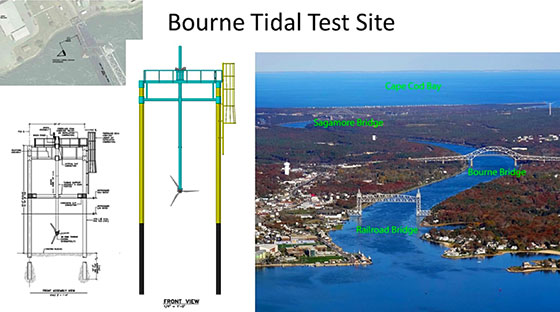
Schematic of Bourne Tidal Test structure.
First Permanent Tidal Test Stand in the US Approved
After several environmental studies and careful review by multiple agencies, the Marine Renewable Energy Collaborative (MRECo) has received final approval from the US Army Corps of Engineers to install the Bourne Tidal Test Site within the Cape Cod Canal. “We are very pleased the Corps of Engineers has determined that the Bourne Tidal Test Site will have no impact on the critical mission of the Cape Cod Canal and the local environment”,said John Miller, Executive Director of the MRECo.
Funding for the test site was provided by the Seaport Economic Council. The site is located well outside the commercial channel and tucked into an accessible spot near the railroad bridge on the mainland side of the canal.
Water velocity has been measured at over 2 meters/second (4 knots) on the maximum tidal cycle in both directions, enough to turn different types of tidal turbines to test their efficiency, power output, robustness and more. Turbines of up to 3 meters can be tested with vertical lift provided for easy access.
MRECo expects to install the platform in November and is accepting proposals for testing in the spring of 2018. Organizations, individuals, companies, and research institutions that would be interested in using the site for testing their own tidal energy devices and/or marine and remote sensors should contact John Miller at: director@mreconewengland.org; 508.728.5825
Area within Muskeget Channel that has been tested for tidal and current energy production.
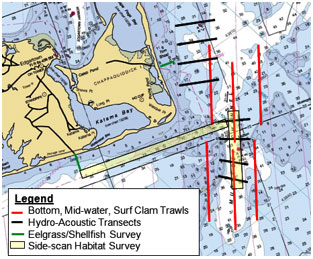
Area within Muskeget Channel that has been tested for tidal and current energy production.
MRECo Seeking Turbine for the Muskeget Channel
(Marion, MA) The good news is that the current does not run as fast in Muskeget Channel as anecdotal accounts would have you believe. The turbulent waters between Martha’s Vineyard and Muskeget Island (a small uninhabited island off Nantucket) have been considered dangerous to pleasure boaters due to torrents of water that flow there. Ten years ago, the town of Edgartown wanted to pursue clean energy solutions for their community and the prospect of capturing just a little bit of that fast current that roils eastward of Chappaquiddick would be something to achieve. The clean energy committee worked with various parties to conduct resource and environmental studies to characterize the area and to locate a spot where the conditions would favor tidal or current energy production. Since 2013 the Marine Renewable Energy Collaborative of New England, Inc. (MRECo) has led this effort.
Earlier this summer, MRECo, worked with partners to conduct additional resource assessments. WaterCube (Daniel Island, SC) conducted water velocity profile surveys of the area and located areas where the current flows up to 2m/second on all tidal cycles.
( To see studies completed to date: http://www.mrec.umassd.edu/resourcecenter/muskegettidalproject)
MRECo is now reaching out to tidal developers worldwide to find the best technology for the channel. So far over thirty turbine developers have been contacted and 25% of those have entered discussions with MRECo.
For more information, please contact: John Miller, Executive Director, 508-728-5825; director@mreconewengland.org.
Wednesday, August 30, 2017
Call for Abstracts: 2018 AGU Ocean Sciences Meeting, Feb. 11-16, 2018 Portland, OR
Submission Deadline: 6 September 2017, 11:59 P.M. EDT
Session ID: 24443: Ocean Renewable Energy: Resource Characterization, Environmental Impacts, Societal Interactions.
Primary Chair: M Reza Hashemi, University of Rhode Island, Department of Ocean Engineering and Graduate School of Oceanography, Narragansett, RI, United States
Co-chairs: Simon P Neill, Bangor University, Bangor, United Kingdom, Zhaoqing Yang, Pacific Northwest National Laboratory, Seattle, WA, United States and Jeremy Potter, Bureau of Ocean Energy Management, Department of the Interior, Camarillo, CA, United States
https://agu.confex.com/agu/os18/preliminaryview.cgi/Session24443
The ocean represents a vast and largely untapped renewable energy resource that could be harnessed to support sustainable development while reducing carbon emissions. However, much research is required within the oceanographic community, in collaboration with other disciplines, to characterize ocean resources, and to assess the environmental impacts of ocean renewable energy systems. This session seeks contributions spanning a broad range of topics related to ocean renewable energy (offshore wind, wave, ocean current, tidal) research such as resource assessment, instrumentation, feedbacks between power extraction and the resource, and optimization at array or regional scales.
Contributions regarding potential environmental impacts (physical/biological), and societal interactions (e.g., social acceptance) are also invited. For instance, research methods, plans, and results from global investigations into field techniques, statistical modeling, and integrative mapping used to assess the impacts of offshore renewable energy system on presence, distribution, migration, dispersal, and/or abundance of marine species at local and regional scales. We also invite reports of research into the potential or existing effects such as the presence of artificial habitat, noise, electromagnetic field emission, and species barrier or displacement, at specific sites in the marine environment.
Follow this link for a printable version of this news release.
MRECo invites you to stay informed!
Join Our Mailing List
Upcoming
MRECo E-News:
 August 5, 2021 – Summer News
August 5, 2021 – Summer News- November 19, 2018 – MRECo Thanksgiving News
- September 13, 2018 – End of Summer News!
- June 28, 2018 – RECo Seeks Funding for Students, Interns and STEM Project & DE-FOA-0001885: RFI: MARINE AND HYDROKINETIC TECHNOLOGIES: MARITIME MARKETS REPORT
- June 6, 2018 – MRECo Seeks Funding for Students, Interns and STEM Project
- May, 5 2018 – Speakers Confirmed for Ocean Wind, Wave and Tidal Energy – May 16, 2018
- December 12, 2017 – Holiday Greetings from the Crew at MRECo
- November 21, 2017 – Bourne Tidal Test Site Installation Complete
- September, 28, 2017 – First Permanent Tidal Test Stand in the US Approved
- August 30, 2017 Call for Abstracts: 2018 AGU Ocean Sciences Meeting
- June 20, 2017 – MRECo Summer Update Bourne Tidal Test Site Structure Complete
- May 4, 2017 – Bourne Tidal Test Site Update and May 6 ROV Competition
- January 20, 2017 – New Ocean Energy Webinar Series Begins January 24
- December 17, 2016 – MRECo Holiday News and Greetings
 October 27, 2016 – Panelists Lead MTS TechSurge on Non-grid connected applications for ocean energy
October 27, 2016 – Panelists Lead MTS TechSurge on Non-grid connected applications for ocean energy- October 24, 2016 – Register today for Ocean Energy for non-Grid Connected Applications
- October 21, 2016 – Bourne Tidal Test Site Receives Preliminary Permit from FERC
- September 16, 2016
- September 6, 2016
- July 8, 2016
- May 17, 2016
- March 14, 2016
- December 1, 2015
- November 10, 2015
- February 3, 2015
- December 11, 2014
- October 13, 2014
- August 12 , 2014
- April 29, 2014
- March 10, 2014
- December 23, 2013
News of Interest

Nonprofit secures license to test ‘minimal impact’ tide-powered turbines: ‘Reliable, predictable, and available’

Cape Cod Times – May 13, 2024-
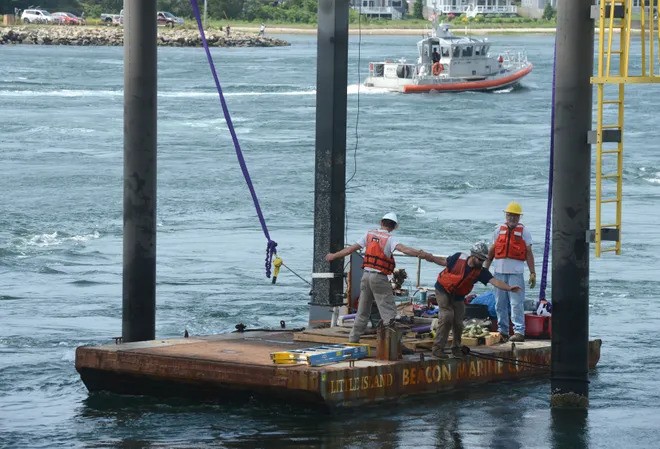
A U.S. Coast Guard boat steams past in 2021 as workers prepare to deploy a tidal turbine onto a lift arm on a platform just west of the railroad bridge on the Cape Cod Canal in Buzzards Bay. The site is used to test technology that would allow tidal waters to produce electric power.
- Harnessing the tides. Cape Cod Canal site gets federal OK to test water-powered turbines A U.S. Coast Guard boat steams past in 2021 as workers prepare to deploy a tidal turbine onto a lift arm on a platform just west of the railroad bridge on the Cape Cod Canal in Buzzards Bay. The site is used to test technology that would allow tidal waters to produce electric power.
Cape Codders and Islanders know about harnessing ocean winds to create renewable energy.The region has become a pioneer with the nation’s first large-scale offshore wind farm — Vineyard Wind.Now Cape Cod may be on the cusp of being a national trail blazer for another green technology, one that uses the power of the ocean itself — and, by extension, the moon — to make electricity.
Marine Renewable Energy Collaborative, a Marion nonprofit that promotes sustainable development of renewable energy in New England ocean waters, has secured an 8-year pilot license from the Federal Energy Regulatory Commission to test prototypes of turbines that harness tides to create energy.
[ Read the complete story. >>> ]
-

Sunday Journal – Tidal Power with Marine Renewable Energy Collaborative
Hear Executive Director of the Marine Renewable Energy Collaborative, John Miller, on Sunday Journal PodCast from August 29, 2021. John spoke about the organization’s recent test of the Bourne Tidal Test Site. [ Listen now. >>> ] 
marineenerty.biz
Massachusetts tidal test site in line to go online
September 13, 2018
The Bourne Tidal Test Site (BTTS), located in Cape Cod Canal, has been allocated a grant that will enable the connection of the site to the power grid. Namely, the organization in charge of test site development – Marine Renewable Energy Collaborative (MRECo) – has been included in the Massachusetts Economic Development Bill to receive at least … [ Read the complete story. >>> ]
Office of Energy Efficiency & Renewable Energy
Energy Department Selects Six Awardees for $6.7 Million in Marine Energy Funding
June 8, 2018
The Energy Department today announced six awardees selected to receive a total of $6.7 million in federal funding to support the development of innovative technologies capable of generating reliable and cost-effective electricity from U.S. water resources. Each award had been selected as an alternate in a previous funding opportunity.This funding comes from the Office of Energy Efficiency and Renewable Energy’s (EERE) Water Power Technologies Office. A key goal of the water office is driving down the cost of energy from marine energy devices. Marine energy technologies are at an early stage of development due to the fundamental scientific and engineering challenges of generating power from complex, low-velocity and high-density dynamics in a corrosive operational environment. Improving installation, operation, and maintenance (IO&M) strategies is an essential step toward that outcome. To that end, the Igiugig Village Council (IVC) in Alaska, in partnership with… [ Read the complete story. >>> ]- Researchers Look at Tidal Turbines as Renewable Energy Source
WCAI – Local NPR for the Cape, Coast & Islands
By SARAH TAN – May 15, 2018
With its rushing current and ever-changing tides, the Cape Cod Canal has become the country’s first test site for a new kind of renewable energy source. Researchers at the University of Rhode Island and the Marine Renewable Energy Collaborative hope that soon they’ll be able to add tidal energy to the list of renewable energy sources, and the canal could be the place where companies test prototypes… [ Follow this link to hear the broadcast and read the full story! >>> ]  MRECo Executive Director, John Miller was interviewed by Sarah Tan at WCAI-Woods Hole, MA. Tan wanted to know what is happening with tidal energy world wide, in the US and at the Bourne Tidal Test Site located in the Cape Cod Canal. The story will be combined with a field interview Tan will make to the BTTS later next week (weather dependent).
MRECo Executive Director, John Miller was interviewed by Sarah Tan at WCAI-Woods Hole, MA. Tan wanted to know what is happening with tidal energy world wide, in the US and at the Bourne Tidal Test Site located in the Cape Cod Canal. The story will be combined with a field interview Tan will make to the BTTS later next week (weather dependent).
January 21, 2018
Endura 100 at Work in Cape Cod, MA
In December 2017, graduate students from the Dept. of Ocean Engineering at the Graduate School of Oceanography – University of Rhode Island, in collaboration with the Marine Renewable Energy Collaborative (MRECo) of Marion MA , deployed an Acoustic Doppler Current Profiler (ADCP) in the Cape Cod Canal. The instrument is doing a high resolution study on the currents at the MRECo Bourne Tidal Test Site adjacent to the Train Bridge. [ Read complete story. >>> ]
Maritime Journal – by Anne-Marie Causer December 12, 2017
Tidal energy technology developer Sustainable Marine Energy (SME) and Schottel Hydro have completed the installation of a new tidal energy platform in Scotland.
The PLAT-I tidal energy system at Connel, near Oban, has been designed for inshore tidal sites to provide power at a community scale helping to establish tidal energy as a viable clean energy alternative for coastal and islands with limited infrastructure.“As a team we have taken PLAT-I from drawing board to first power generation within a period of 15 months – this is a real achievement and testament to the talent and dedication of our staff. The support of the Scottish Government as well as our supply chain partners and investors has also been instrumental to this success,” said Jason Hayman, managing director of SME. [ Read complete story. >>> ]
Sea Technology magazine – November 2017 Issue
First Tidal Test Site Approved For Cape Cod Canal
After several environmental studies and careful review by multiple agencies, the Marine Renewable Energy Collaborative (MRECo) has received final approval from the U.S. Army Corps of Engineers to install the Bourne Tidal Test Site within the Cape Cod Canal. [ Read the complete story. >>> ]
Cape Cod Times – December 6, 2017
URI Engineers to Use New Canal Tidal Test Site
BUZZARDS BAY – The new tidal test site in the Cape Cod Canal will soon be in use.Engineers from the University of Rhode Island plan to use the new test turbine to gather data on changes in water velocity. URI wants to use an acoustic doppler to gather information to map water velocity variations during a number of tidal cycles.URI represents the first organization that will work at the facility, which was completed a just few weeks ago. [ Read the complete story. >>> ]
Cape Cod Times – by Ethan Genter November 23, 2017
Cape Cod Canal turbine testing site complete
BUZZARDS BAY — The Bourne Tidal Test Site has been fully installed in the Cape Cod Canal near the railroad bridge.Workers from AGM Marine finished the work on the Marine Renewable Energy Collaborative test site, which is the first of its kind in the U.S., on Tuesday, said Maggie Merrill, spokeswoman for the collaborative. [ Read the complete story. >>> ]
Cape Cod Times – by Ethan Genter November 12, 2017
Cape Cod Canal turbine testing site taking shape
Work is now underway on the Marine Renewable Energy Collaborative’s Bourne tidal test site, a facility that is the first of its kind in the country and would allow researchers and developers to try out their hydrokinetic turbines in the Cape Cod Canal.The U.S. Army Corps of Engineers awarded MRECo the permit for the testing site next to the railroad bridge on the Buzzards Bay side of the canal in October. By Friday, workers from AGM Marine, a Mashpee-based company, had installed two pylons into the canal’s floor for the structure. [ Read the complete story. >>> ]
The Bourne Enterprise – by Karen B. Hunter – November 9, 2017
Bourne Tidal Turbine Test Site Becomes A Reality
Work began this week on the mainland side of the Cape Cod Canal, right next to the abutment for the railroad bridge in Buzzards Bay, to build a testing structure for tidal turbines—turbines that generate energy by harnessing the power of tidal flow. Once built, it will be one of just two testing structures of its kind in the world—and the only one in the United States. [ Read the complete story. >>> ]
Renewable Energy Magazine – by Dan McCue – Monday, 23 October 2017
Deepwater Wind Aims to Bring Economic Benefits to New Bedford
If approved by the MassachusettsDepartment of Public Utilities, Deepwater Wind will establish a construction and long-term operations hub in the City of New Bedford for its Revolution Wind project.The company signed a Letter of Intent with Massachusetts in September of 2016 to lease the New Bedford Marine Commerce Terminal as a staging and deployment location for the Revolution Wind and future wind projects.The company’s plans to use the New Bedford Marine Commerce Terminal and other facilities in the City are seen by some as a way to jumpstart the offshore wind industry in Massachusetts.Operated by MassCEC, the New Bedford Marine Commerce Terminal is a multi-purpose, 26-acre facility designed to support the construction, assembly and deployment of offshore wind projects, as well as handle bulk, break-bulk, container and large specialty marine cargo. [ Read the complete story. >>> ]
Cape Cod Times – by Ethan Genter – October 4, 2107
Tidal turbine test site at Cape Cod Canal gets green light
BUZZARDS BAY — The Marine Renewable Energy Collaborative has received approval to install a first-of-its-kind tidal turbine test site on the Cape Cod Canal. “It really has potential to drive developers to the region,” said John Miller, the nonprofit’s executive director.The U.S. Army Corps of Engineers awarded the collaborative a yearlong renewable license to run the test site near the railroad bridge, Miller said. The site will have a platform that can be raised and lowered from the canal, allowing hydrokinetic turbine developers to test out their equipment before going into full production. [ Read the complete story. >>> ] Hydro International – October 4, 2017
Hydro International – October 4, 2017
First Permanent Tidal Power Test Site in the US Approved
After several environmental studies and careful review by multiple agencies, the Marine Renewable Energy Collaborative (MRECo)has received final approval from the US Army Corps of Engineers to install the Bourne Tidal Test Site within the Cape Cod Canal. The test stand will be installed in a sheltered spot where access is exclusively via the Army Corps of Engineers’ facility (where fishing from shore is not permitted) and where it is far out of the navigational channel. [ Read the complete story. >>> ]- BBC News – September 25, 2017
£4.5m boost for Anglesey tidal energy development
The Welsh Government has announced £4.5m in funding for marine and tidal energy development in north Wales. [ Read the story. >>> ] 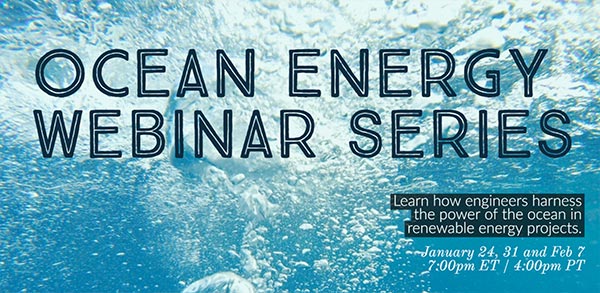
New Ocean Energy Webinar Series
Held January 24, 2017
The ocean is a vast and almost entirely un-tapped source of energy, and has the potential to be a leading
alternative source of clean, renewable power.
[More information. >>>]- CapeCod.com – August 4, 2017
Canal Water Turbine Testing Facility Waiting for Final Approval
BOURNE –Plans for the construction and installation of a water turbine test facility in the Cape Cod Canal are on hold as it awaits final approval from the Army Corps of Engineers.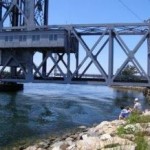 The turbine-testing facility would be installed under the railroad bridge by the Marine Renewable Energy Collaborative (MRECo).The New England non-profit organization is working to advance ocean renewable energy projects. [ Read the story. >>> ]
The turbine-testing facility would be installed under the railroad bridge by the Marine Renewable Energy Collaborative (MRECo).The New England non-profit organization is working to advance ocean renewable energy projects. [ Read the story. >>> ] - Tidal Energy Today – October 28, 2016
Bourne tidal site to feed data to NERACOOS
John Miller, MRECo Director, said, “This is the first and very important step to gaining all the regulatory permits required for the test site, which will be the first in the United States. MRECo was given preliminary permission to work in an area that covers more than just the spot where the actual structure will be. This was done to allow studies of adjacent areas that might be impacted.” [ Read the story. >>> ] - HydroWorld.com
WASHINGTON, D.C.
10/26/2016
By Michael Harris, Associate Editor
MRECo receives FERC permit for tidal energy test site
The Federal Energy Regulatory Commission has approved a preliminary permit submitted by the Marine Renewable Energy Collaborative, helping clear the way for the development of the Bourne Tidal Test Site in Massachusetts’ Cape Cod Canal.As planned, the Bourne complex will include a structure onto which turbines up to 100 kW in capacity and three meters in diameter can be tested. The Marine Renewable Energy Collaborative (MRECo) said energy generated at the site would be stored locally, thus qualifying the proposal for FERC’s “Verdant Rule” due to it not being connected to the grid. [ Read the story. >>> ] - Tidal Energy Today – September 19, 2016
Bourne tidal site to feed data to NERACOOS
The Northeastern Regional Association of Coastal Ocean Observation Systems (NERACOOS) will host and post the data that will be generated from the Bourne Tidal Test Site in Cape Cod Canal, Massachusetts. The data will be available to professionals, students, and the public on the NERACOOS web site that already hosts data coming from many sources in New England waters, the Marine Renewable Energy Collaborative (MRECo) informed. [ Read the story. >>> ] - The Bourne Enterprise – Calvin M. Cutler, June 30, 2016
Canal Waters Surveyed For Turbine Testing
Standing on the mainland side of the Cape Cod Canal, in a spot tucked underneath the railroad bridge, Teledyne Marine Group applications engineer Jeffrey Den Herder held a large remote control . [ Read the story. >>> ] - Vineyard Gazette – Alex Elvin, June 29, 2016
Tidal Energy Project Gains Fresh Momentum
Plans to develop a permanent tidal energy test site in the Cape Cod Canal may bode well for a long-stalled effort to bring tidal energy to Muskeget Channel off Chappaquiddick. [ Read the story. >>>] - The Boston Globe – Steve Maas, April 8, 2016
The Marine Renewable Energy Collaborative will soon install the nation’s first permanent facility to evaluate submerged turbines that generate electricity from tidalpower.http://www.bostonglobe.com/business/2016/04/07/tidalpower/RJTFbOkT2240YOD0OsdPCP/story.html?s_campaign=8315 - ECO, Environment Coastal & Offshore magazine included a story about the test site in their April 2016 edition, page 62. https://www.ecomagazine.com/search?searchphrase=all&searchword=MRECo%20Funded
- Minesto and partners receive financing for marine power R&D
Vastra Frolunda, Sweden – 12/07/2015 [ Read the story. >>> ] - Edgartown Explores Tides As Potential Future Renewable Energy Source
-by The Cape and Islands NPR stations, WCAI 90.1, WNAN 91.1,b WZAI 94.3
December 8, 2014 [ Read the story. >>> ]
- More MRECo News
- Friday July 25, 2017
- Information Contact: Maggie Merrill Communications and Marketing Director, Marine Renewable Energy Collaborative (comms@mreconewengland.org)
- Data Transmission Tests Underway in Advance of Tidal Power Test Site
- (Bourne, MA) Engineers associated with the Bourne Tidal Test Site (BTTS) have been field testing a simulation of the data acquisition system that will be installed on the actual tidal turbine test structure. BTTS is going through its last paces for permitting and once the US Army Corps of Engineers, USACE, signs off, the actual test structure will be installed.
- To enable tidal device designers and developers to understand how their turbine is performing in the Cape Cod Canal, they will need to know what the current velocity is during all tide cycles. In order to do that, a team of talented engineers, inventors and scientists are collaborating to see firsthand how fast the water is moving in the Cape Cod Canal and how much power one might be able to harness once a turbine is installed.
- There have been several small scale demonstrations done in waters near Buzzards Bay, using a series of small parts and home spun resources to show how data from the FSI ACM Current Meter can be collected , processed and transmitted via sophisticated telemetry to computers anywhere in the world.
- The real time current data was captured by an ACM-PLUS-200 acoustic current meter from Falmouth Scientific Inc.(Cataumet, MA) FSI VP of Sales & Marketing, Carl Mancuso stated, “we are happy to work on this important application for our technology. Ocean energy operations worldwide require precise and reliable current speed and direction readings. We welcome the opportunity to contribute to the establishment of the BTTS”.
- FSI’s ACM-Plus-200 is measuring current in meters per second. That data is then being processed using software provided by piRshared (Wareham, MA). That “scrubbed” data will eventually be transmitted through a powerful computer that will be installed on top of the tidal test structure. The data will then be transmitted via Wifi and/or cellular service to the website for display (www.mreconewengland.org).
- The data output is being hosted at a web site which was created by Bradshaw Lupton of piRshared, a Wareham system integrator and engineering genius. piRshared is supplying system design, integration, many small and big parts and a demonstration site located close to the canal.
- A key element of the BTTS project is to inspire students of all stripes to get involved. To that end we have been reaching out to STEM organizations throughout the US and within MA and the region. “Thanks a key volunteer, Bradshaw Lupton of piRshared we were able to put the FSI ACM in the pool during the recent MATE ROV Competition at the Sandwich STEM Academy pool to show the students, teachers and parents how to capture, transmit and display real time water velocity data using off the shelf equipment and ingenuity. We continue to demonstrate the ins and outs of the data transmission system that when fully operational aboard the BTTS structure will enable students from around the world to access the data and make predictions of power output for their various engineering projects, said John Miller, Executive Director, MRECo.
- # # #
- Marine Renewable Energy Collaborative (MRECo) is a nonprofit corporation that educates and involves all stakeholders (Academic, industry, governmental/regulatory, and public interest groups) to promote the sustainable development of renewable energy in New England ocean waters. To do this, MRECo must establish. MRECo envisions a future where New England obtains a significant, amount of its power (5% or more) from reliable and predictable ocean based renewable energy technologies. To do so, MRECo supports the infrastructure for testing that allows the cost effective, rapid commercialization of new sustainable technologies being developed by the rich entrepreneurial environment of the region. www.mreconewengland.org
- Seaport Economic Council is funding the development of the Bourne Tidal Test Site (BTTS) as part of Baker-Polito administration’s commitment to promote prosperity in seaport communities of all sizes as well as to cultivate job and economic growth in the maritime economic sector. The Seaport Economic Council, chaired by the Lieutenant Governor of the Commonwealth and administered by the Executive Office of Housing and Economic Development with support from the Office of Energy and Environmental Affairs, challenges the 78 coastal communities of Massachusetts to leverage their unique geographic advantages in order to grow jobs and the economy as well as prepare for the future as we confront the challenges posed by sea level rise and increasingly powerful coastal storms.
- Falmouth Scientific Inc. (FSI) designs, manufactures and services sophisticated instruments and systems for ocean and fresh water environments. They offer standard and customized sensors and systems for current, wave and tide measurement, as well as sonar scanning systems and acoustic transducers. Customers and applications include offshore oil operations, research programs, marine transportation, environmental monitoring and more. Their 30 plus years in the industry and their close proximity to the Cape Cod Canal (Cataumet, MA) make them a perfect partner. www.falmouth.com
- Impact LABS (New Bedford, MA) and its sponsors and partners, including Analog Devices, Dell, Intel, PTC and V5 Systems, share a mission to support businesses that are pursuing resilience: profitable, sustainable operations. This mission includes a particular focus on intersections between natural resource management and green infrastructure. Marine kinetic energy is a perfect market for us to support in this sense. We are thrilled to partner with MREC at the Bourne Tidal Test Site to help advance profitable, sustainable businesses in marine renewables.” — Chris Rezendes, Founder, Impact LABS. www.iotimpactlabs.com
- piRshared Labs (Buzzards Bay, MA) is an integration, communications, software, hardware, mechanical engineering firm founded by three former roommates at Worcester Polytechnic Institute in 1968. Their work spans and connects all current platforms from the Internet of Things on esp8266, arduing, raspberry pi, android, IOS, through to IBM BlueMIX and Watson products. The Bourne Tidal Test Site demonstration project involves the firm’s marine sensor, mechanical engineering and communications experts in placing instrumentation in inland waterways and transmitting the data through the cloud via MQTT for STEM students and others to view. piRshared will offer iOT classes at Sandwich High School in September. Many thanks to contributors: Jeff Coleman, Scott Haigh, Raymond Coleman and Bradshaw Lupton.
- [ View printable copy of this news release. (pdf)>>> ]
- Marine Renewable Energy Collaborative (MRECo)- to Manage Tidal Testing at Turners Falls, MA (Marion, MA)
Tuesday, February 3, 2015 [ Read the full release. (pdf)>>> ] - Baker-Polito Administration Announces $6.6 Million in Seaport Economic Council Grants to Coastal Communities and Economic Development Initiatives
Friday, November 20, 2015
Grants will support economic development initiatives and infrastructure improvementsBuzzards Bay – Today the Baker-Polito Administration’s Seaport Economic Council announced awards to Chatham, Gosnold, Marshfield, New Bedford, Quincy, Salem, Saugus, Salisbury, Winthrop, and the Marine Renewable Energy Collaborative. [ Read the full release. (pdf)>>> ]



